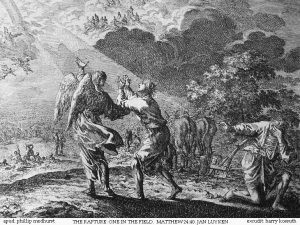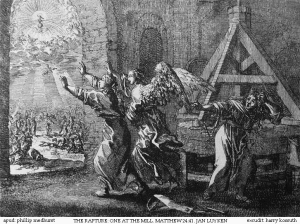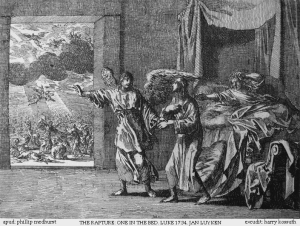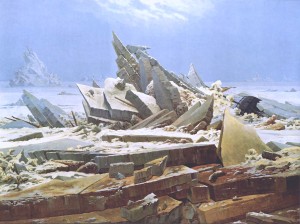The prospect of a looming global catastrophe has since time immemorial exercised a remarkable fascination on the human mind. Responsibility probably lies with Noah and the Flood. After all, nobody would be likely to forget an event of that magnitude in a hurry.
 This fascination—obsession, even—doubtless leads fundamentalists to pore over the Revelations of St John the Divine in order to figure out the precise time of the Second Coming.
This fascination—obsession, even—doubtless leads fundamentalists to pore over the Revelations of St John the Divine in order to figure out the precise time of the Second Coming.
The fact that Jesus tells us that no one shall know the time of his arrival does not seem to act as a deterrent. Nor does the fact that all the latter–day apocalyptic prophets have been utterly wrong seem to discourage others from taking up the quest.
Sooner or later, of course, one of them is bound to be right—simply on the principle that even blind squirrels occasionally find nuts. But until that takes place, we must steel ourselves to watch congregations of the gullible disconsolately sitting on church roofs awaiting the end of the world.
Actually, there’s nothing particularly new about this. It was widely believed in what was then known as Christendom that the Second Coming would take place in A.D. 1000. Thus, many pious and not so pious people concluded it would be a waste of time to plant crops and to pursue their trades.
Instead, they settled down to have a high old time, eating, drinking, and being very merry in the belief that the world would end before the earthly piper had to be paid. The consequences were widespread hunger and civil strife as the feckless fought those who were more prudent for their food.
 Our technologically savvy sophisticates, however, have no reason to feel superior to their Bible-thumping brethren. Just think of the sturm und drang caused by our computer aficionados in the year 2000.
Our technologically savvy sophisticates, however, have no reason to feel superior to their Bible-thumping brethren. Just think of the sturm und drang caused by our computer aficionados in the year 2000.
People who paid heed to the apocalyptic prophecies of the technology age didn’t look so very different from fundamentalists crouching on church roofs.
The media, of course, has always adored ‘end of the world as we know it’ yarns—none more so than so-called ‘newspapers of record’. For example, when New York’s city fathers were debating introducing electric power, the august New York Times waxed hysterical with editorials conjuring up grim images of electrocuted cab horses and the like.
I’m old enough to recall—or at least be aware of—any number of apocalyptic scares that made life interesting in the nuclear age.
Among my favourites was the suspicion voiced during the Second World War that the Nazis were working on diverting the Gulf Stream with the idea of turning the British Isles and North Eastern Canada into icebergs.
After Germany’s surrender, authorship of the scheme was transferred to the Soviets, presumably on the grounds that a good apocalypse should never be allowed to go to waste.
Since then we have enjoyed any number of ‘end of the world’ scenarios, some more benign than others.
 I personally enjoyed the ‘Strontium 90 Scare’ of the 1950s that postulated that fallout from nuclear tests was making cows’ milk radioactive.
I personally enjoyed the ‘Strontium 90 Scare’ of the 1950s that postulated that fallout from nuclear tests was making cows’ milk radioactive.
The nasty watery milk the British government imposed by law on helpless school children like me was quite loathsome. But I decided that if I had to drink the miserable stuff, the prospect of becoming a mutant and growing a second head was really quite beguiling.
Sad to say, none of the other apocalyptic visions have measured up to ‘Strontium 90’. True, being wiped out by a hydrogen bomb had certain elements of—albeit short-lived—drama.
But the prospect of nuclear winter (a scare that enjoyed a couple of revivals) seemed simply a case of ‘been there done that’ to a person who has lived on England’s East Coast, not to mention Scandinavia and Eastern Europe.
It will be fascinating to discover what form the next apocalypse will take. Some folks might argue that it is already here in the form of ‘Global Warming’, or ‘Climate Change’ as it is now called. Some folks might be treating it like that, but, personally, I don’t think it qualifies.
It’s not that I am a Climate Change ‘Denier’—perish the thought. I couldn’t possibly deny it. After all, if the geological record is anything to go by, it has been going on since the world began. For instance, an Ice Age, mercifully long past, played a major role in shaping the continent on which we live.
What’s more, before the ‘Mini-Ice Age’ which arrived in the late Middle Ages (and, indeed, remains with us today) much of Greenland was actually green. Indeed, it supported quite a sizeable population until vast glaciers rendered it uninhabitable to all but the Inuit.
In the parts of Greenland accessible during its short summer, archaeologists have unearthed towns and villages complete with churches, burial grounds and cathedrals.

Das Eismeer (The Sea of Ice) by Caspar David Friedrich (1774–1840), inspired by William Edward Parry’s account from the 1819–1820 expedition to discover the Northwest Passage.
Today people tend to assume that a North West Passage separating the North American Continent from the Arctic was a myth. This is untrue. Hudson & Co were seeking it because it was known to Vikings explorers. What they didn’t realise was it had iced up with the advent of the Mini-Ice Age.
My difficulty with the current Climate Change debate is that I find it hard to accept that the assumption that the news is all bad. If, in fact, the world is actually getting warmer, it could on balance ultimately be very good for mankind.
Certainly, there would be losers as well as gainers. Greenlanders, for example, lost out very badly in the last major round of climate change. May be they are due for a break.
The thing that’s really irritating about the current debate is that nobody seems to be investigating the potential benefits of global warming—whether, for example, it means vast new areas of the world will become suitable for cultivation. If they are, nobody seems to be paying heed to their findings.
Years ago we hooted with laughter at a cheap whisky sold in Denmark that proclaimed it was made from ‘genuine Scottish grapes.’ Scotland is far too cold for viticulture. Yet when the Romans arrived in Britain, wine grapes were routinely grown there. Who knows, one day soon they may be able to do so again?
The Danes might well drink to that. GPH✠


